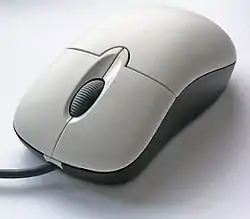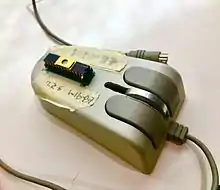Scroll wheel
A scroll wheel is a wheel used for scrolling. The term usually refers to such wheels found on computer mice (where they can also be called a mouse wheel). It is often made of hard plastic with a rubbery surface, and on a mouse is usually located between the left and right mouse buttons and is positioned perpendicular to the mouse surface.

Functionality
Most often, rolling the upper side of the wheel away from your body is to scroll "upward" or "forward", and the reverse direction is to scroll "downward" or "backward".
In a graphical user interface, the "upward" motion moves contents of the window downward (and the scrollbar thumb, if present, upward), and vice versa. In other configurations (sometimes called "natural scrolling") the effect is inverted.
On a mouse, the scroll-wheel can often also be used as a third mouse button by pressing down on it.
Some mice can scroll horizontally as well as vertically, using a tilting scroll-wheel, or additional wheel on a perpendicular axis located elsewhere on the mouse.
The wheel is often, but not always, engineered with detents to turn in discrete steps, rather than continuously as an analog axis, to allow the operator to more easily intuit how far they are scrolling.

Scroll wheels are prevalent on modern computer mice and have become an integral part of the hardware interface. However, non-wheeled mice are still available.
History
The scroll wheel on a mouse has been invented multiple times by different people unaware of the others' work.
Other scrolling controls on a mouse, and the use of a wheel for scrolling both precede the combination of wheel and mouse. The earliest known example of the former is the Mighty Mouse prototype developed jointly by NTT, Japan and ETH Zürich, Switzerland (Kunio Ōno, Ken'ichi Fukaya and Jürg Nievergelt) in 1985. It had a thumb-operated combined analog button/toggle switch on the side for smooth scrolling.[1]
At the ACM SIGCHI conference in 1989, Gina Danielle Venolia from Apple presented a mouse prototype with a horizontal thumb-wheel for scrolling and for moving along the Z-axis.[1] In her patent application from 1992 wheels were on both sides and vertical wheels.[2] Jack McCauley claims to having developed an early mouse prototype with a top-mounted wheel for the Z-axis, at about the same time.[3][4]

In 1995, the Taiwanese company KYE Systems released the first commercial mouse with scroll wheel. It was named Genius EasyScroll and was also available as Mouse Systems ProAgio.[5][6][7][8]
The scroll wheel was popularized by the Microsoft IntelliMouse in 1996 along with support for the mouse wheel in Microsoft Office 97. It had been based on ideas developed by Eric Michelman since 1993 with input from Chris Graham.[5][9]
Scroll wheels can also be found on such handheld devices such as PDAs, or mobiles phones such as early Sony models and BlackBerry devices. They have also appeared on keyboards, particularly on Logitech and Microsoft models, usually located to the left of the caps lock key.
Alternatives
Instead of a scroll-wheel, some mice (and other devices) use an alternative but similar component.
Laptop computers often include a touchpad programmed with a pointing device gesture that mimics a scroll-wheel (either by dedicating an edge of the pad for scrolling, or activating scrolling through a multitouch gesture). Many Linux distributions offer a method of scrolling using the touchpad where the user will first activate scroll-mode by pressing in a corner of the pad, and then dragging in a circle around the center of the pad; letting go of the touchpad will switch back to the default mouse-mode.
In mice, alternatives include scroll balls (similar to trackballs, such as on Apple's Mighty Mouse and some serial/PS/2 mice, which combine horizontal and vertical scrolling), pointing sticks,[10] integrated touchpads (as on Apple's Magic Mouse) or optical sensors,.[11] Unusual examples include a joystick-style hatswitch present on an early Saitek mouse,[12] and a central 4-way switch-pad found on the Cherry Power Pad Mouse M-1000.
Other applications
Scroll-wheel motion is often used to control other aspects of a system. For instance, it can allow the user to switch between a series of options, zoom in or out, or increment/decrement any value.
In first person shooter computer games, scroll-wheels are often used to switch between weapons, zoom in/out a telescopic sight, or even to allow the player to lean left and right if horizontal scrolling is available.
CAD applications such as AutoDesk's AutoCAD use the mouse wheel to navigate the space in which the user is drawing. This has also become a de facto standard in 3D applications such as Trimble's SketchUp where the wheelscroll is zoom, and wheelclick with a mouse drag is orbit.
See also
References
- Buxton, Bill, "Chapter 2: An Illustrated Tour" (PDF), Human Input to Computer Systems: Theories, Techniques and Technology, retrieved December 8, 2018
- US 5313230A, Venolia, Daniel S. & Shinpei Ishikawa, "Three degree of freedom graphic object controller", published July 24, 1992, issued May 17, 1994
- Mickelwait, Kirsten (27 July 2015). "Modern-day Edison Creates Engineering Design Fund" (Press release). Retrieved 21 April 2017.
- Oculus Co-Founder Jack McCauley - IGN Unfiltered 13 (Interview). 13:44: IGN. 2016-11-29. Retrieved 2018-12-08 – via Youtube.CS1 maint: location (link)
- Coding Horror: Meet The Inventor of the Mouse Wheel
- gearrate.com – History of Computer Mouse (1964 ~ 2020)
- funtrivia.com – Quiet As a Mouse – Fun Facts, Questions, Answers, Information Archived 2013-06-12 at the Wayback Machine
- Joe Kissell (2004-10-07). "The Evolution of Scrolling: Reinventing the wheel". Interesting Thing of the Day. Retrieved 2010-02-12.
- The History of the Scroll Wheel
- "TrackPoint Mouse G1".
- "Navigator 525 Laser Mouse".
- GM1 Scroll Mouse, archived from the original on 2003-02-10, retrieved 2015-07-26